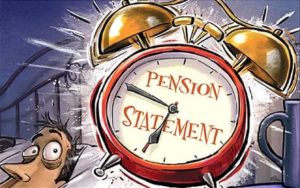State’s final rules on energy siting raise host of questions
 The Michigan Public Service Commission’s (MPSC) final rules for implementing the new law on renewable energy siting generally favor solar and wind developers over local governments and are particularly unsympathetic toward counties. MAC recently reported on the release of the formal application instructions and procedures following a lengthy stakeholder engagement process and multiple rounds of public comment. The final product is substantially different from both the law and initial MPSC recommendations.
The Michigan Public Service Commission’s (MPSC) final rules for implementing the new law on renewable energy siting generally favor solar and wind developers over local governments and are particularly unsympathetic toward counties. MAC recently reported on the release of the formal application instructions and procedures following a lengthy stakeholder engagement process and multiple rounds of public comment. The final product is substantially different from both the law and initial MPSC recommendations.
Defining ‘Affected Local Unit’
Public Act 233 defines an “affected local unit (ALU)” as “a unit of local government in which all or part of a proposed energy facility will be located.” Meaning, if a facility lies in a township, then a county is also an affected local unit. The law goes on to say that if a project is sited by the MPSC a developer “shall enter into a host community agreement with each affected local unit.” Additionally, a developer “shall make a one-time grant to each affected local unit for an amount determined by the commission but not more than $75,000 per affected local unit and not more than $150,000 in total,” to be deposited into an intervenor compensation fund.
The MPSC rules, however, define an ALU as “limited to include only those local units of government that exercise zoning jurisdiction.” This means that if a county is not responsible for zoning, they are ineligible for the $2,000 per megawatt community host agreement dollars and intervenor funds. In April, MAC submitted public comment to the MPSC arguing that all counties “will be impacted by the presence of a renewable energy facility: county resources will be utilized, infrastructure will be altered, acres will be occupied, constituents will voice their concerns, master plans will be re-examined, etc. It is critical that all levels of government are recognized when administering PA 233.” Ultimately, the MPSC prioritized the wants of developers in this section.
Compatible Renewable Energy Ordinance (CREO)
In the rules, the MPSC establishes that it will not resolve disputes over what is and what is not a CREO. If an ALU claims to have a CREO but includes any provisions not explicitly outlined in section 226(8) of the PA 233, a developer can file a complaint with an “administrative law judge pursuant to the Commission’s rules of practice and procedure.” The ALU will then be ineligible for the community host agreement dollars and intervenor funds, in addition to losing CREO status. The rules make no mention of a path toward regaining CREO status, which was previously included in staff recommendations.
Should an ALU adopt a “workable ordinance” rather than a CREO, and a developer decides they would prefer to go through the MPSC process, the ALU is then still eligible for community host agreement dollars and intervenor funds.
What’s next?
The vast discrepancies between the rules and statute will undoubtedly result in litigation. The new law takes effect on Nov. 29 and MAC anticipates several lawsuits, both before and after that date. In fact, Foster Swift and Cato Township have already initiated a class action lawsuit against the MPSC. If a municipality is interested in joining the suit, Foster Swift has encouraged them to contact their office prior to Nov. 8.
MAC will continue to provide updates as they become available.
For more information on this issue, contact Madeline Fata at fata@micounties.org.
Podcast 83: Contest for Michigan House is tight, pundits say
 With the General Election rapidly approaching, Podcast 83 invited Adrian Hemond of Grassroots Midwest and John Selleck of Harbor Strategic to provide insight into the contests. Hemond and Selleck focused on some key state House races, the open U.S. Senate seat and a few U.S. House races, delving in to what potential outcomes could mean for Michigan.
With the General Election rapidly approaching, Podcast 83 invited Adrian Hemond of Grassroots Midwest and John Selleck of Harbor Strategic to provide insight into the contests. Hemond and Selleck focused on some key state House races, the open U.S. Senate seat and a few U.S. House races, delving in to what potential outcomes could mean for Michigan.
Hemond gave an overview of what he believes are the five most crucial Michigan House races in November, commenting, “From my perspective, both sides have plenty of seats that are in play this time.”
With the two-seat Democratic majority in the House, Selleck noted, “It’s an uphill battle for Democrats, and frankly the place we could end up that we have now started talking about is 55-55 (in the Michigan House).”
To view the full episode, recorded on Oct. 21, click here.
Previous episodes can be seen on MAC’s YouTube Channel.
And you always can find details about Podcast 83 on the MAC website.

Flooding in Midland County in 2020.
FEMA seeks proposals to reduce threats of natural hazards
The Federal Emergency Management Agency (FEMA) is seeking project proposals for eligible hazard mitigation activities. Building Resilient Infrastructure in Communities (BRIC) and Flood Mitigation Assistance (FMA) are FEMA grant programs that provide funding for projects that aim to “reduce or eliminate future property damages and loss of life from natural hazards, such as flood, tornadoes, and storms.”
Local governments must provide a Notice of Intent (NOI) to the Michigan State Police, Emergency Management and Homeland Security Division (MSP/EMHSD) before Nov.24, 2024. The MSP/EMHSD will then review the NOIs and invite potential sub-applicants to formally apply for grant funding through FEMA.
For more information on this issue, contact Madeline Fata at fata@micounties.org.
Treasury seeks feedback on pension grant reporting
 The Michigan Department of Treasury is assisting the Municipal Stability Board (the Board) to solicit feedback on the proposed Corrective Action Plan Monitoring Form for Protecting MI Pension Grant recipients.
The Michigan Department of Treasury is assisting the Municipal Stability Board (the Board) to solicit feedback on the proposed Corrective Action Plan Monitoring Form for Protecting MI Pension Grant recipients.
Per Public Act 166 of 2022, Section 979a, local governments receiving grants must be monitored by the Board for five years.
At the Sept. 18, 2024, meeting, the Board approved the draft monitoring form for public comment. This form, which outlines oversight for pension fund management, can be viewed with other Board documents at https://www.michigan.gov/MSB.
The Draft Form may be reviewed here:
Any individual or organization that would like to submit comments should provide those comments in writing by Nov. 1, 2024.
Comments may be submitted by email to: LocalRetirementReporting@michigan.gov with the subject line titled, “Pension Grant Corrective Action Plan Monitoring Form Public Comment: 2024.”
 Staff picks
Staff picks
- How emergency agencies can manage a storm of misinformation (Governing)
- Sustainable funding for local governments (Citizens Research Council of Michigan)
- More states are planning for the coming retirement surge (RouteFifty)
- Participants get ‘second chance’ training in county jobs (NACo County News)
